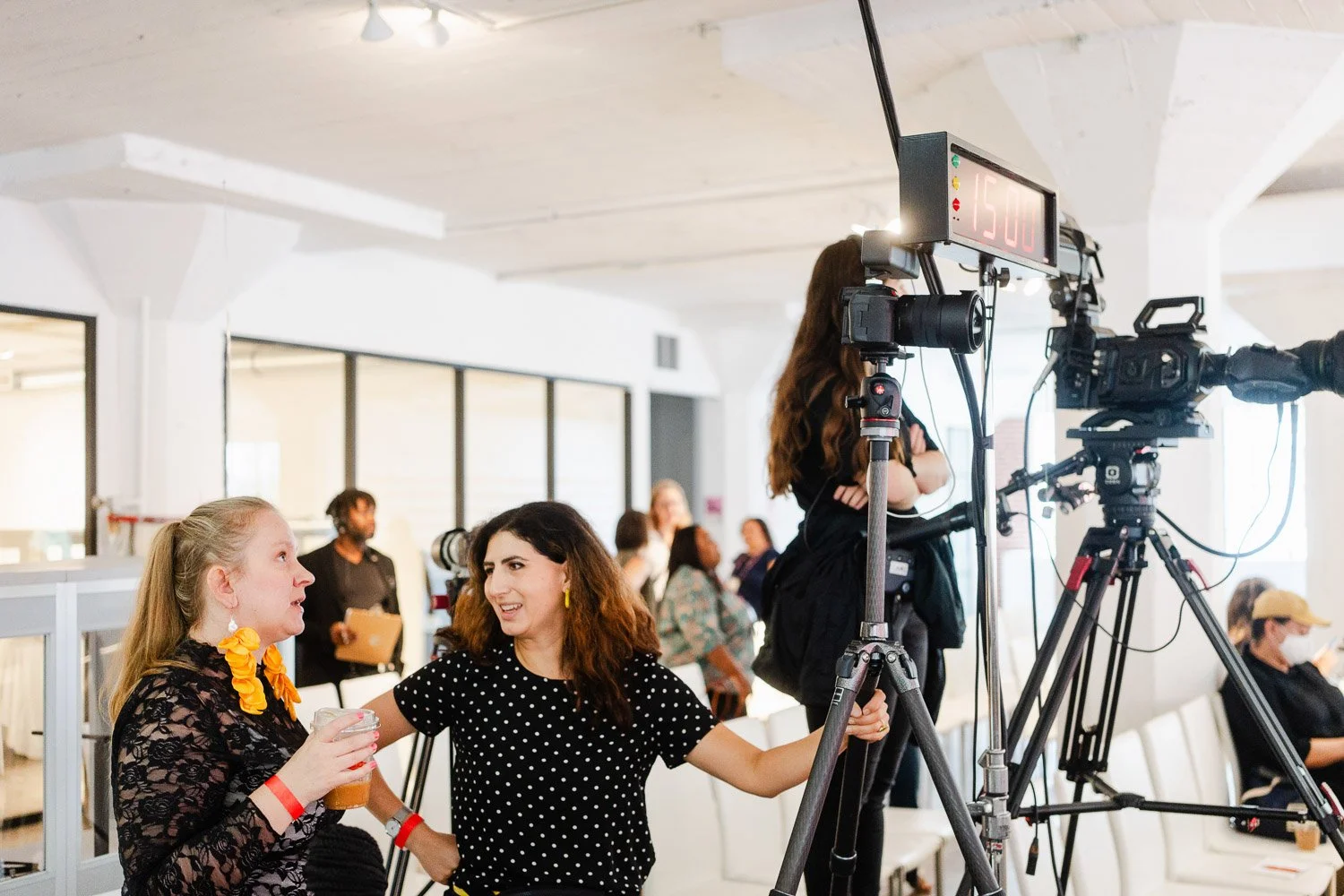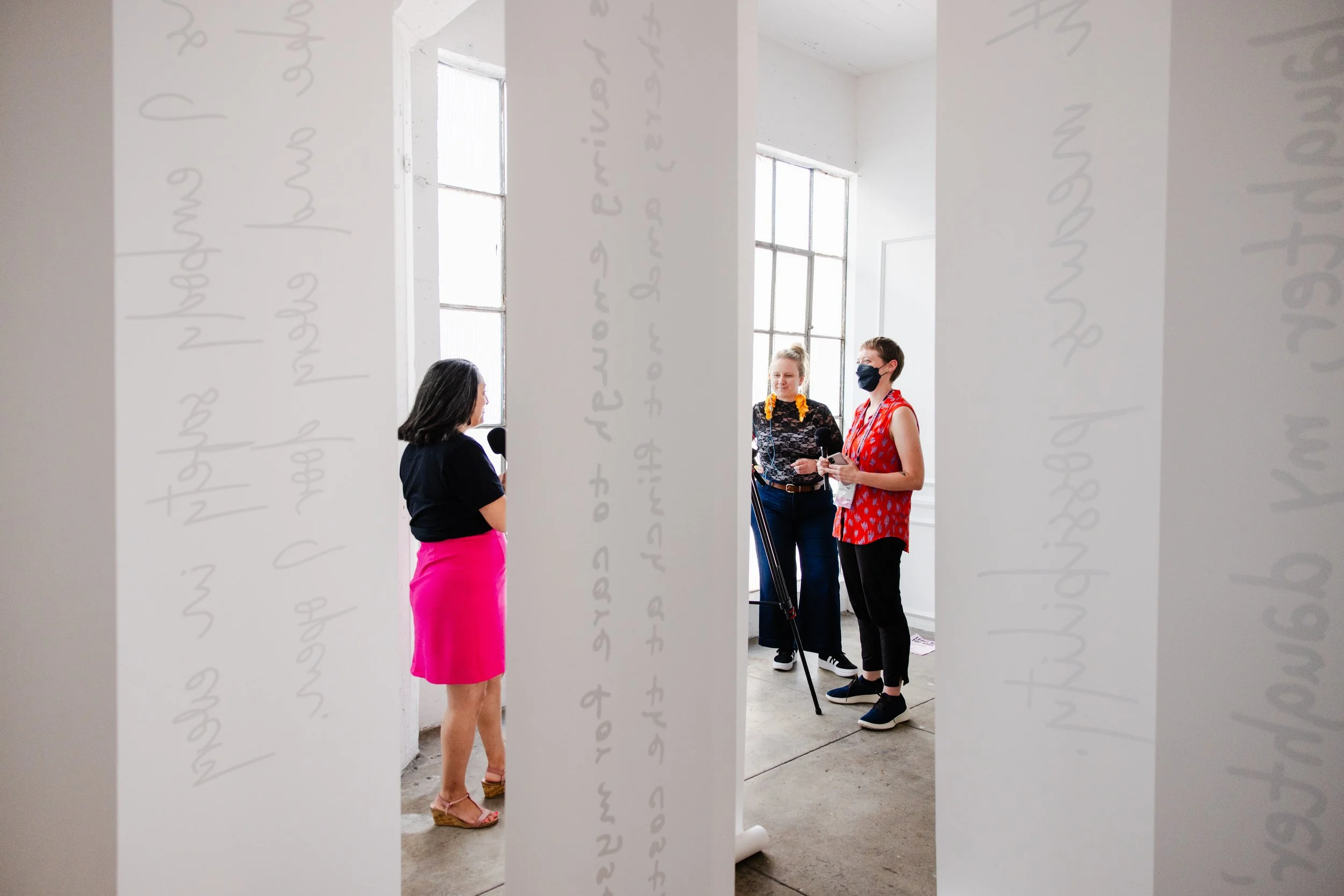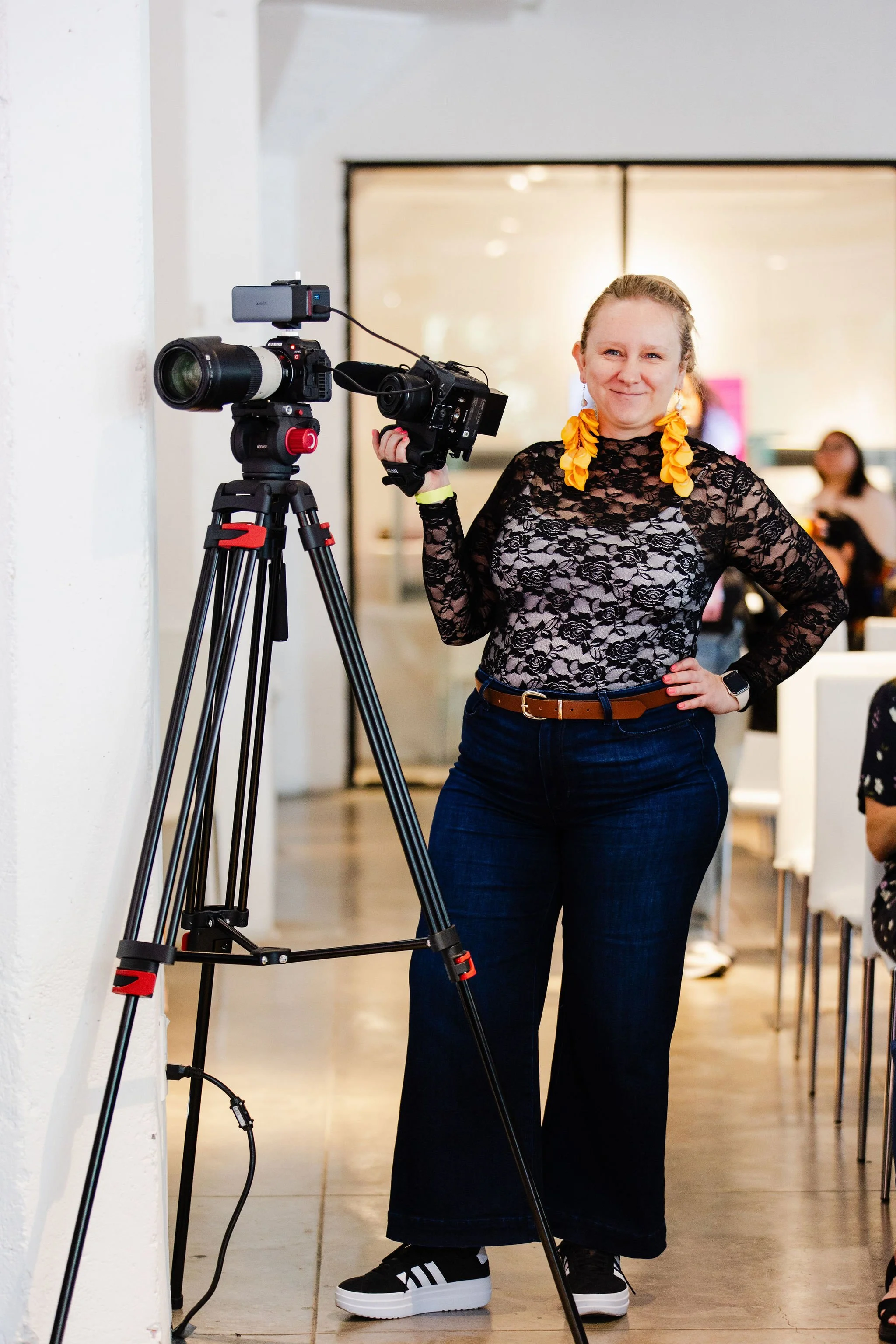How to Hire a Video Production Company for Your Nonprofit: The Complete Guide
In this guide, you'll learn how to evaluate video production partners, what questions to ask before signing a contract, and how to find a collaborator who truly understands your mission and can help you tell stories that drive impact.
What we'll cover:
Why hiring the right video partner matters
Questions to ask before you hire
What to look for in a portfolio
Red flags and how to spot them
Understanding timelines and workflows
How to evaluate budget and value
What great collaboration actually looks like
If you're a nonprofit leader tasked with hiring a video production company, you're probably discovering that the options are overwhelming. How do you choose the right videographer or production partner for your organization?
Some videographers charge $2,000. Others charge $30,000. Some have gorgeous portfolios but can't articulate strategy. Others talk a big game about "storytelling" but their work feels flat.
And then there's the biggest challenge: how do you know if they actually understand nonprofit work?
Because here's the reality: filming a corporate product launch is fundamentally different from capturing the emotional weight of a reentry program gala. Shooting a tech startup's brand video requires different skills than documenting the stories of vulnerable communities with dignity and care.
The right video production partner doesn't just have good gear and editing skills. They understand your mission, respect your audience, ask smart questions, and help you think strategically about how media supports your goals.
This guide will help you find that partner.
Why Hiring the Right Video Production Company Matters for Your Nonprofit
Let's start with why this decision is so important.
A great video can:
Help close a major gift
Inspire hundreds of small donations during a year-end campaign
Build trust with funders and board members
Elevate your organization's credibility and professionalism
Give your team language and assets to talk about your impact with confidence
Live on your website and work for you for years
A mediocre video can:
Sit unused because it doesn't quite fit your needs
Miss the emotional core of your story
Feel generic or impersonal
Require expensive reshoots because key elements were missed
Damage trust if vulnerable stories aren't handled with care
Panel discussion at the 2024 premiere of the Survivor Made documentary, produced by nonprofit, FreeFrom. Nonprofit storytelling requires the ability to capture nuanced conversations, multiple perspectives, and the emotional depth of mission-driven work.
The stakes are high. Your mission deserves media that works as hard as you do.
Questions to Ask Before You Hire A Video Production Team For Your Nonprofit Event
These questions will help you separate vendors from strategic partners, and surface potential issues before they become problems.
About Their Experience
"Have you worked with nonprofits or mission-driven organizations before?"
Why it matters: Nonprofit storytelling requires specific skills. Finding the best video production company for nonprofits means finding someone who understands filming fundraising galas, interviewing program participants, and documenting sensitive stories with care. This demands a different approach than corporate or commercial work. You want someone who understands the nuances of your sector.
What to listen for: Specific examples. "Yes, we've worked with several nonprofits including [names and types of organizations]." If they haven't worked with nonprofits but are eager to learn, that's not necessarily a dealbreaker, but it does mean you'll need to do more educating.
"Can you share examples of work that's similar to what we're looking for?"
Why it matters: You want to see proof they can deliver the style, tone, and emotional depth you need.
What to listen for: They should be able to point to specific projects and explain the story, the approach, and the outcome. If their portfolio is all corporate explainer videos and you need emotionally resonant donor stories, that's a mismatch.
"What's your background? How did you get into video production?"
Why it matters: Their training and experience shape how they approach storytelling. Someone with a journalism background will ask different questions than someone who came up through wedding videography. Someone with marketing experience will think differently about deliverables than someone who only knows film production.
What to listen for: Look for depth, curiosity, and a commitment to storytelling (not just technical skills). Bonus points if they mention journalism, documentary work, or mission-driven projects.
About Their Process
"What does your discovery or pre-production process look like?"
Why it matters: This is where you'll learn if they're a strategic partner or just a camera operator. A strategic partner wants to understand your mission, your audience, your goals, and how the media will be used before they ever show up to shoot.
What to listen for: They should talk about discovery calls, planning sessions, shot lists, interview prep, and aligning on deliverables. If they say "Just tell us when and where to show up," that's a red flag.
"How do you help us figure out what we actually need?"
Why it matters: You might think you need a 5-minute video, but what you really need is a 2-minute hero video plus 10 social cuts. A good partner will help you think through this.
What to listen for: Strategic thinking. They should ask questions like: Where will this be used? Who's the audience? What action do you want people to take? What formats do you need (horizontal, vertical, both)?
"What questions will you ask us before the shoot?"
Why it matters: Great interviews don't happen by accident. A skilled storyteller reverse-engineers interview questions based on the answers you want to hear.
What to listen for: Thoughtfulness. They should want to know what story you're trying to tell, what emotional beats matter, and what key messages need to come through.
About Collaboration & Communication
"What does the timeline typically look like from start to finish?"
Why it matters: You need to know when to expect deliverables, especially if you're working toward a campaign deadline or event date.
What to listen for: A clear breakdown: discovery (X weeks), shoot day(s), editing (X weeks), revisions (X weeks), final delivery. If they're vague ("It depends"), push for specifics based on a project like yours.
"How many rounds of revisions are included?"
Why it matters: You want to understand the feedback process upfront so there are no surprises later.
What to listen for: A clear answer (typically 2-3 rounds for most projects). Also listen for how they handle feedback. Do they seem open and collaborative, or defensive?
"Who will we be working with day-to-day?"
Why it matters: Will you be working directly with the person you're talking to now, or will your project be handed off to a junior team member?
What to listen for: Clarity about who's leading the project, who's on set, and who you'll communicate with during editing.
"How do you handle scope changes or additions mid-project?"
Why it matters: Sometimes you realize halfway through that you need something you didn't originally plan for. You want to know how flexible they are and what that costs.
What to listen for: Transparency. A good partner will say something like, "We try to plan thoroughly upfront to avoid surprises, but if scope changes, we'll talk through what that means for timeline and budget before moving forward."
About Strategy & Deliverables
"How do you approach storytelling for nonprofit work?"
Why it matters: This reveals their philosophy and whether they understand the unique challenges and ethics of nonprofit storytelling.
What to listen for: Words like "authenticity," "dignity," "collaboration," "impact," "audience." They should talk about finding the human story, not just documenting an event.
"Do you think about where and how this content will be used when you're shooting?"
Why it matters: A marketing-savvy partner will ask about platform specs, aspect ratios, and repurposability from the start. A less experienced one won't think about this until it's too late.
What to listen for: Yes. They should ask questions like: Do you need vertical video for Instagram? Do you want b-roll clips you can use later? Should we shoot with graphics/text overlays in mind?
"What deliverables are included in your quote?"
Why it matters: "A video" can mean a lot of different things. You need clarity on what you're actually getting.
What to listen for: Specifics. One 3-minute video? Multiple cuts? Raw footage? B-roll library? Photo stills? Horizontal and vertical versions? The more detail, the better.
About Budget & Investment
"Can you walk me through what's included in this price?"
Why it matters: Price alone doesn't tell you much. You need to understand what you're paying for.
What to listen for: A breakdown that includes pre-production, shoot day(s), crew size, equipment, post-production, revisions, and deliverables. Transparency here is key.
"What would make this project cost more or less?"
Why it matters: Understanding the variables helps you make informed decisions about scope.
What to listen for: Honest answers. More shoot days, more locations, more deliverables, faster turnaround, or additional team members all increase cost. Simplifying scope can bring cost down.
"Do you offer payment plans or phased payments?"
Why it matters: Nonprofit budgets are often tight. Knowing payment structure upfront helps with planning.
What to listen for: Flexibility. Many production companies do 50% upfront, 50% on delivery, or split payments across milestones.
What to Look for in a Portfolio When Choosing an Event Video Production Company
When you're reviewing a video production company's past work, here's what to pay attention to:
Story Over Aesthetics
Yes, the video should look professional. But pretty footage doesn't mean much if the story falls flat.
Ask yourself:
Does this move me emotionally?
Can I follow the narrative arc?
Do the interviews feel authentic, or do they sound scripted and stiff?
Does the story have a clear beginning, middle, and end?
What to watch for: Work that prioritizes human connection and emotional resonance, not just beautiful cinematography.
Variety and Depth
A strong portfolio shows range. You want to see that they can handle different types of projects and storytelling approaches.
Ask yourself:
Do they have multiple nonprofit or mission-driven projects, or just one?
Can they do both intimate, emotional storytelling and energetic event coverage?
Do they show versatility in tone, style, and audience?
What to watch for: Depth in nonprofit work specifically. One nonprofit project might be a fluke. Multiple projects show commitment and understanding.
From panel discussions and keynote presentations to candid moments of connection and celebration, nonprofit storytelling requires the ability to capture both the big moments and the intimate ones that show the human impact of your work.
Technical Quality
You don't need to be a videographer to spot good production value.
Ask yourself:
Is the video well-lit and well-composed?
Is the audio clear? (Bad audio is a dealbreaker.)
Does the editing feel smooth, or are there awkward cuts and pacing issues?
Are graphics and text overlays clean and professional?
What to watch for: Consistent quality across multiple projects. One gorgeous video in a sea of mediocre work is a red flag.
Audience Connection
The best nonprofit videos don't just tell you about the work. They make you feel something and want to take action. When evaluating video production services for your nonprofit, this emotional connection is critical.
Ask yourself:
Would this video inspire me to donate if I didn't know this organization?
Does it make the mission feel urgent and important?
Do I walk away understanding both the problem and the impact?
What to watch for: Work that moves beyond "look at what we do" and lands in "here's why it matters."
Representation and Respect
If your work involves vulnerable populations or sensitive stories, you need to see evidence that this production company handles those stories with care.
Ask yourself:
Do the people on camera feel like they have agency, or do they feel exploited for emotional impact?
Is there diversity in who's represented and how?
Does the storytelling feel trauma-informed and dignity-centered?
What to watch for: Thoughtfulness. Stories that center the people being served, not just the organization.
Red Flags: Questions That Help You Spot Issues Early
You don't want to call out bad vendors directly, but you do want to protect yourself from common pitfalls. Here are questions that will reveal potential problems:
"Do you have a standard package, or is everything custom?"
Why you're asking: Cookie-cutter packages often mean a one-size-fits-all approach that doesn't account for your unique needs.
Red flag answer: "We have three set packages: Bronze, Silver, and Gold. Pick one."
Good answer: "We customize every project based on your goals, but here's generally what's involved..."
"How much input will we have during the process?"
Why you're asking: You want a partner who collaborates, not someone who disappears and hands you a finished product with no input.
Red flag answer: "We'll take care of everything. You don't need to worry about it."
Good answer: "We'll involve you in key decisions—story direction, interview questions, rough cut review—but we'll also guide the process so you're not overwhelmed."
"What happens if we're not happy with the first draft?"
Why you're asking: This reveals how they handle feedback and whether they're defensive or collaborative.
Red flag answer: "That's never happened." Or: "Changes after the first draft cost extra."
Good answer: "We include [X] rounds of revisions, and we'll work closely with you to make sure the final product is exactly what you need."
"Can you show me examples of work you've done for organizations like ours?"
Why you're asking: You want proof they understand your sector and your audience.
Red flag answer: Vague responses, or pivoting to unrelated work.
Good answer: Shows you 2-3 relevant projects and explains the story, approach, and results.
"What's your approach to working with interview subjects, especially vulnerable populations?"
Why you're asking: This is critical if your work involves people in recovery, people experiencing homelessness, youth, trauma survivors, or any sensitive population.
Red flag answer: "We just ask them to share their story." Or: No clear answer at all.
Good answer: Talks about trauma-informed practices, consent, dignity, collaboration, and ensuring subjects feel safe and respected.
"What do you need from us to make this project successful?"
Why you're asking: A good partner will be clear about what they need from you (access, coordination, shot lists, approvals, etc.). A bad one will assume they can figure it out alone and then blame you when things go wrong.
Red flag answer: "Nothing, we've got it covered."
Good answer: A clear list of needs—logistics coordination, interview subject recruitment, messaging guidance, feedback on drafts, etc.
Understanding Timelines and Workflow
A professional video production company should be able to walk you through a clear timeline. Here's what a typical project looks like, though timelines can vary significantly based on when you book and what your project needs:
Phase 1: Initial Discovery & Contract (Variable timing)
Initial consultation and goal-setting
Scope alignment and proposal
Contract and payment terms
Timeline note: You might book your nonprofit event videographer months in advance (especially for annual events like galas), or you might have a quick turnaround project. Either way, this initial phase happens first.
Phase 2: Pre-Production Planning (Typically 2 to 4 weeks before shoot)
This is when the detailed planning happens, regardless of how far in advance you booked.
Story development and messaging alignment
Shot lists and interview question prep
Logistics coordination (locations, subjects, scheduling, permissions)
Venue walkthrough (if applicable)
Final timeline and day-of coordination
Timeline note: If you book months in advance, most of the heavy planning happens closer to your shoot date. You might have periodic check-ins in the interim, but intensive pre-production typically ramps up about a month before the shoot.
Phase 3: Production (1 to 3 days, depending on scope)
Shoot day(s)
Interviews, b-roll, event coverage, keynote recordings, etc.
Phase 4: Post-Production (2 to 4 weeks after shoot)
Editing and story assembly
First draft review and feedback
Revisions
Final delivery
Behind the scenes of Solhaus Media at the Survivor Wealth Summit. Professional nonprofit video production involves careful coordination, the right equipment, and creating an environment where interview subjects feel comfortable and empowered to share their stories.
Total timeline: Varies widely based on your project and availability.
If you book far in advance: You might sign a contract in April for an August event, have light check-ins over the summer, intensive planning in July, shoot in August, and receive final deliverables by mid-September.
If you need a faster turnaround: Projects can happen on much tighter timelines. You might book 3 to 4 weeks before your event, move quickly through planning, shoot, and receive deliverables within 5 to 6 weeks total.
Rush projects: In some cases, even tighter timelines are possible depending on the production company's availability and your project scope.
Key questions to ask:
If we book now for an event that's [X months away], what does the timeline look like?
When do we need to lock in details like shot lists and interview subjects?
What's the turnaround for post-production after the shoot?
What happens if our event date changes?
How long do you keep our footage on file in case we want to use it later?
What Great Collaboration Looks Like
The best client-vendor relationships with your event videographer don't feel transactional. They feel like partnerships.
Here's what you should expect from a great video production collaborator:
They listen more than they talk. In early conversations, they ask thoughtful questions about your mission, your goals, and your challenges. They don't jump straight to talking about their gear or their process.
They help you think strategically. They don't just say "yes" to everything you ask for. They help you figure out what you actually need, what formats will work best, and how to get the most value from your investment.
They're transparent about costs and scope. No surprise charges. No vague answers. If something will cost more, they tell you upfront and explain why.
They respect your expertise. You know your mission, your audience, and your community better than anyone. A good partner defers to that knowledge and collaborates with you, rather than assuming they know best.
They're proactive communicators. You shouldn't have to chase them down for updates. They keep you in the loop and flag potential issues early.
They care about the outcome, not just the output. They want to know: Did the video work? Did it help you raise money, recruit volunteers, or build awareness? They're invested in your success, not just in delivering a file.
How to Make Your Final Decision
You've asked the questions. You've reviewed portfolios. You've narrowed it down to 2-3 strong candidates.
Here's how to make the final call:
Trust Your Gut
Do you feel good about this person or team? Do they seem genuinely interested in your work? Do you feel heard and respected?
If something feels off, pay attention to that.
Look for Mission Alignment
Do they seem to care about the work you do? Do their values align with yours? This matters more than you might think. A partner who's genuinely excited about your mission will bring more creativity, care, and energy to the project.
Prioritize Communication Style
You'll be working closely with this person or team for weeks (or months). Do they communicate in a way that works for you? Are they responsive? Are they clear?
Weigh Experience vs. Enthusiasm
Sometimes a less experienced videographer with deep enthusiasm for your mission will do better work than a seasoned pro who's just treating this as another gig. Use your judgment.
Consider Long-Term Potential
If this project goes well, would you want to work with them again? Are they someone you could build an ongoing relationship with? The best video partnerships are the ones that last.
Final Thoughts: You Deserve a Nonprofit Event Videographer Who Gets It
Hiring a video production company shouldn't feel like a gamble.
When you ask the right questions, evaluate portfolios thoughtfully, and trust your instincts, you'll find a partner who doesn't just deliver a video but helps you tell a story that moves people, builds trust, and drives real impact.
Great video partnerships feel collaborative, not transactional. The best work happens when your production team listens, asks smart questions, and helps you think strategically about how media serves your mission.
Your mission deserves that.
Your team deserves that.
And the people you serve deserve to have their stories told with intention, dignity, and care.
Ready to find the right video partner for your nonprofit?
If you're exploring what strategic, story-driven video could do for your organization, let's start with a conversation. We'll talk about your goals, your challenges, and whether we're the right fit to help you bring your mission to life through media.
like this post? check out more like it!
MEET BERNADETTE
Hi! I'm Bernadette Marciniak, founder of Solhaus Media, specializing in strategic photo and video production for purpose-driven organizations, brands, and non-profits.
With roots in journalism and marketing, I help mission-focused leaders turn their work into powerful, story-driven media that builds trust, inspires donors, and drives impact. From event coverage to brand storytelling, I bring both a journalist's eye for narrative and a strategist's understanding of how content actually gets used.
When I'm not behind the camera, I'm a cat mom of two who loves good pizza, red wine, and way too many true crime documentaries.
Based in Los Angeles, working nationwide.













See how Solhaus Media captured the Survivor Wealth Summit in DTLA through nonprofit event videography rooted in storytelling and social impact.